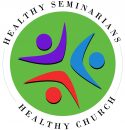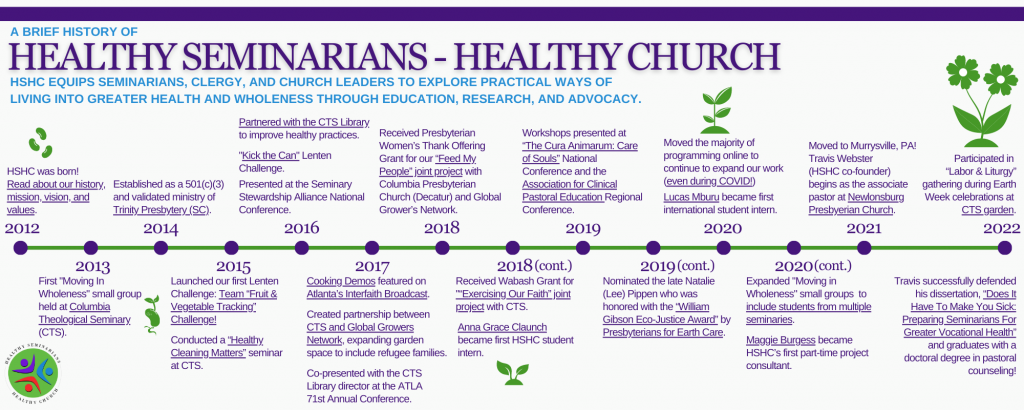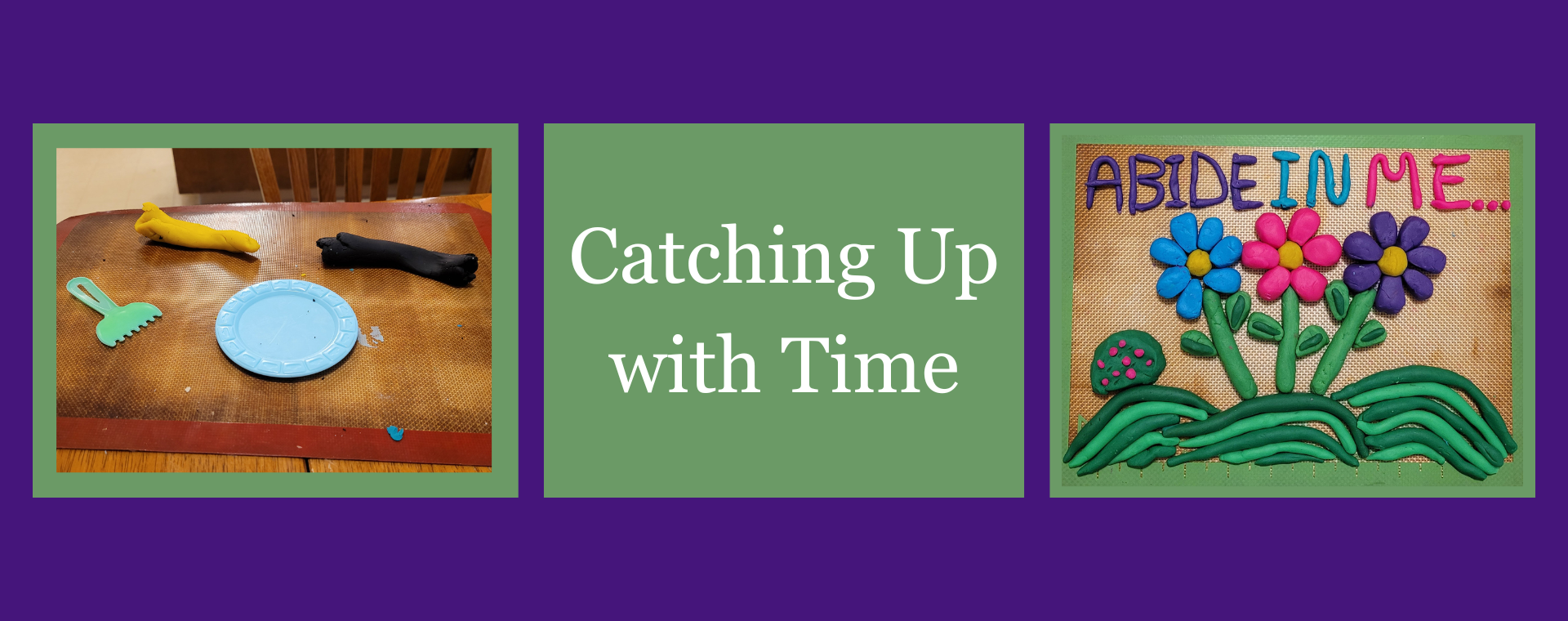
Catching Up With Time
A common theme that others have shared with me recently is their lack of time. “If only I had more time to…” “There just aren’t enough hours in the day to…” “How do I make the most of the time I have left?”
This is certainly not a new issue; people have been wrestling with this since the beginning of time. I know that for me, even as a young child, I would find myself unnecessarily rushing through things and sometimes making errors (especially when doing my math assignments!) because I felt a certain amount of urgency… time was slipping away, so I’d better hurry.
The intensity of this challenge became even more apparent for me personally several weeks ago as I turned another year older. Thankfully, I had a scheduled trip to the west coast to visit my family, as well as some days intentionally set aside to be unplugged from technology, which afforded me the opportunity to pause time so that I could catch up with it.
Pause time?
You can’t do that.
Oh, but I did… although, not in the way I anticipated!
My natural inclination is that, when a challenge arises, I research what others have to say about it. No need to recreate the wheel, times a’ wastin’! Thus, I found myself quickly drawn to New York Times bestselling author Juliet Funt’s book, “A Minute to Think: Reclaim Creativity, Conquer Busyness, And Do Your Best Work.” As I quickly scanned through the opening pages, the premise of the book seemed solid, and I could see that, in the later chapters, it offered what appeared to be some practical suggestions. Yet, as I read it, something felt lacking.
So, I turned to another book that a friend recently told me about: “No Cure for Being Human (And Other Truths I Need to Hear)“ by Kate Bower, who is also a New York Times bestselling author. It, too, was intriguing, but something still felt unsettled inside of me as I tried to figure out how to organize my time. What should my priorities be? What could I let go? What should I do?
Since my research did not seem to be working, I resolved to press on… actively seeking any opportunity where I could carve out space so that I might gain new clarity and/or insight as to how I should approach time.
As timing would have it, that very same afternoon, as I walked into my brother’s kitchen in Washington state, my young nieces (12 and 10) and nephew (6) asked me if I wanted to join them in playing with their playdough. I didn’t waste a skinny minute. I quickly sat down at the kitchen table with them, hoping that, through mushing the dough between my fingers, I could perhaps get a better grasp of time, or at least have some fun trying!
As my nephew busily made a banana and a rolled-up burnt pancake (left image), I wasn’t sure what to do with the blank space sitting in front of me. So, I decided to start by making a daisy flower because they bring me joy… then two daisies… then three… then grass… and then, finally, adding a berry bush that one of my nieces made for me.
As I worked on the final pieces of my now “art” project, I was only marginally aware of how much time had gone by, other than I knew that dinner would be coming soon, so I’d have to finish up. Yet, I wasn’t quite ready. In order for my playdough time to be “officially finished” in my mind, I needed to add some sort of word or phrase to my picture, but what was fitting?
Peace? Joy? Love? As I visualized how each of them would look, none felt right.
Then, suddenly, “Abide in Me…” popped into my mind, and I found myself filled with a great sense of peace… “Abide in me as I abide in you. Just as the branch cannot bear fruit by itself unless it abides in the vine, neither can you unless you abide in me.” – John 15:4
Prior to my playdough time, I knew that I could not slow time or regain time. However, it was in that moment when I was humbly reminded that I had been trying too hard to control time on my own terms rather than abiding (also translated as continuing, staying, remaining) in God.
Once I invited God back to be my “time management partner,” I was able to return to the two books I had started, both offering me new insights as well as practical suggestions (I commend them both to you!).
Praise be to God for providing me the space to catch up and re-establish my relationship with time.
May all be well,
Karen H. Webster
HSHC Cofounder/Executive Director
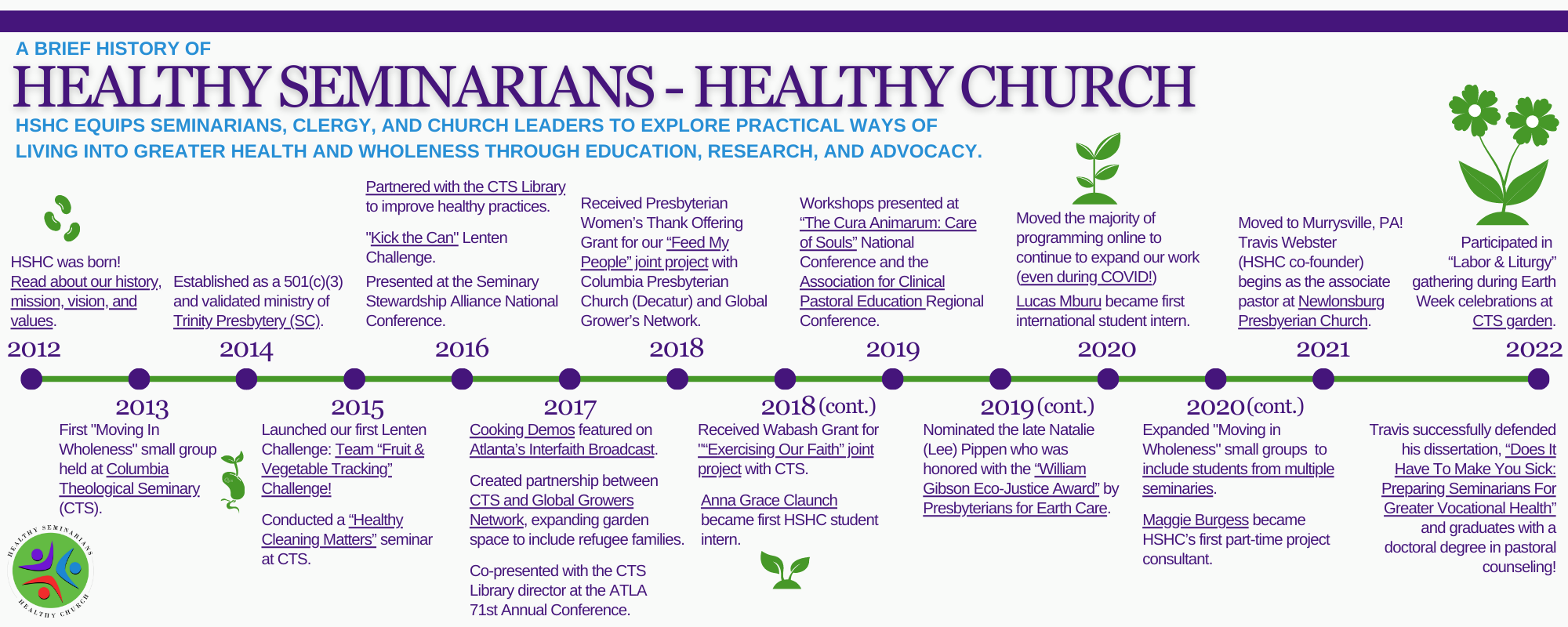
Trail Notes Summer 2022: A Good Argument
A Good Argument
Travis and I will never forget the June night back in 2012 when we went for a walk in Winnona Park (the neighborhood around Columbia Theological Seminary in Decatur, GA). We were there because I was participating in two of my first Doctor of Ministry classes and Travis decided to take some study leave and join me on campus, since he was completely immersed in full-time ministry and felt that this would be an excellent opportunity to rest and reflect.
What started out as a normal conversation while walking quickly became heated, just like the night air (good ol’ summertime in the South!).
“So, Karen, I think I finally do want to apply for the Th.D. in Pastoral Counseling program here.”
This was something that Travis had been talking about since the day we graduated from Princeton Theological Seminary (Princeton, NJ) with our M.Div. degrees in 2004 (Karen’s recollection), so this wasn’t a shock. The difference was that, this time I, Karen, realized he really meant it.
“Ok, so if we move here to Decatur, what am I supposed to do? I want somehow to use the gifts that God has given me – a degree in exercise physiology, ordination as a Presbyterian pastor, certification as a Master Gardener in South Carolina, a love for both cooking and working with people of all ages, and a passion about wanting to improve the health and wellbeing of clergy because, from everything I have read and observed, they are struggling with their health, which not only impacts them personally, but also those whom they serve. Tell me, what kind of job would allow me to do all of that?” I was completely exasperated; if I were a cartoon character, I would have had steam rising off my head!
The conversation abruptly ended there that night, and we went to bed without any resolution.
When we woke up the next morning, Travis said, “Karen, I think I’ve figured out what we can do. It will be a lot of work, but I know we can do it…”
Travis shared his vision and, without even the slightest bit of hesitation, I knew that this was exactly what we were supposed to do. Never mind that we had zero experience starting a non-profit, zero experience in managing a “business,” zero organizations to look to as templates for the kind of ministry we were seeking to establish (to this day, as far as we know, we are the only organization that is seeking to improve the wellbeing of seminarians so that they can be healthier clergy, which will help to bring about greater health in our communities of faith and beyond!). On top of all this, when we shared our ideas with several people we trusted, they said that we were going to face HUGE challenges, so we definitely were going to have our work cut out for us. And, if that weren’t enough of a challenge, we felt called to do this at the same time Travis was beginning to apply for the doctoral program!
Fast forward 10 years… the work that we have undertaken has been anything but easy. There are days when we feel like we are taking two steps forward and then two steps backward, sometimes almost instantaneously. However, seeing the difference that we have made in the lives of seminarians, clergy, and church members makes it all worth it! Plus, it is because of the support and encouragement we have received from people like you that we have been able to learn, grow, and expand our ministry day by day, relationship by relationship.
Speaking of encouragement, when I (Karen) was sorting through some of my old emails as I was preparing the timeline for this newsletter, I came across some of the initial email correspondence we had with Steve Hayner, who was president of Columbia Theological Seminary the year HSHC was born. Here is an excerpt from what he wrote:
“It was both encouraging and exciting to read your report [which we submitted to him on 10/24/12] and to engage again with your vision. Helping to set seminarians on a physically healthy trajectory is as important as working with them intellectually, spiritually, and relationally… Again, Karen, let me commend you on your amazing vision and initiative. You’ve spotted a very real need and moved to meet it. We talk a lot around here about vision, values, and vocation—and about imagination and resilience. You are illustrating all of these traits.”
From the very first day we shared our vision with President Hayner, he was extremely supportive of our work and was also a real source of inspiration. When he was very sadly diagnosed with pancreatic cancer, news that devastated those both inside and beyond the seminary community, one of the things he made sure he accomplished before stepping down due to illness was to provide our organization with an on-campus mailbox and office space. We will never forget his generosity in providing us not only a physical space to meet with those in the Columbia Theological Seminary community, but also giving us what we needed to establish ourselves as a 501(c)(3) organization.
Again, looking back at that June night, who knew ten years later both that this is where God would lead us and also that God would put so many supportive people on our path to guide and encourage us along the way? We eagerly wait to see what God has in store for us in the days, months, and years to come. Now, as much as ever, healthy seminarians + healthy churches = a healthier world!
May All Be Well,
Karen and Travis Webster
HSHC Co-founders
Click below to view our interactive timeline. Each underlined section links to a publication or story from our last decade!
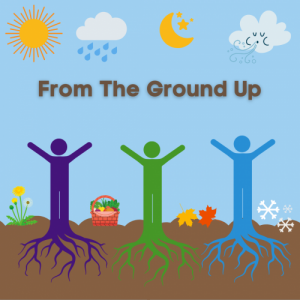
From The Ground Up: Digging Deeper Into Our Body-Garden Connection
From The Ground Up: Digging Deeper Into Our Body-Garden Connection
Over the last several years, there has been a significant increase in the number of articles that discuss the health benefits that people can gain through gardening – opportunities for movement and relationship development, improved mental and spiritual wellbeing, chances to grow local/sustainable food, among other things – which is wonderful. As a gardener myself, I can attest to some of the health benefits I have personally received.
As a result of this recent attention, I have found myself increasingly drawn towards reflecting on our body-garden connection, particularly because I find that so many articles (not all) touch only on the surface-level health benefits of gardening, thus missing the richness that can come from digging more deeply into why there is such a strong connection.
So, why is gardening so good for our health?
1. I think it’s because what both our bodies and plants need to thrive are essentially the same! And, really, this shouldn’t be any surprise given that our lives started in a garden:
“And the Lord God planted a garden in Eden, in the east; and there he put the man whom he had formed. Out of the ground the Lord God made to grow every tree that is pleasant to the sight and good for food, the tree of life also in the midst of the garden, and the tree of the knowledge of good and evil.” ~Genesis 2:8-9
Because people and plants share the same basic needs, and since humans and gardens have such a long-standing relationship, it should be no surprise that there are notable theological parallels that illuminate this connection.
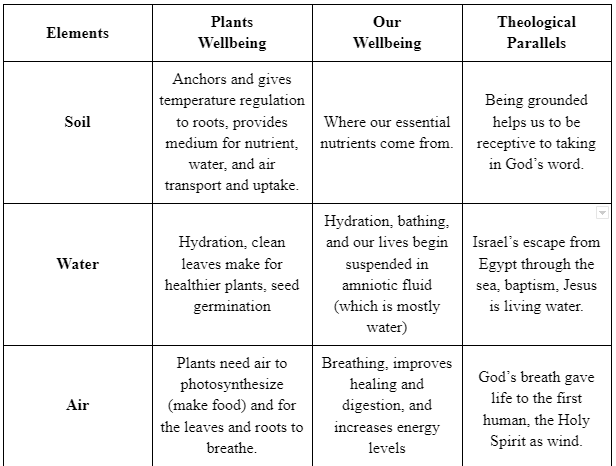
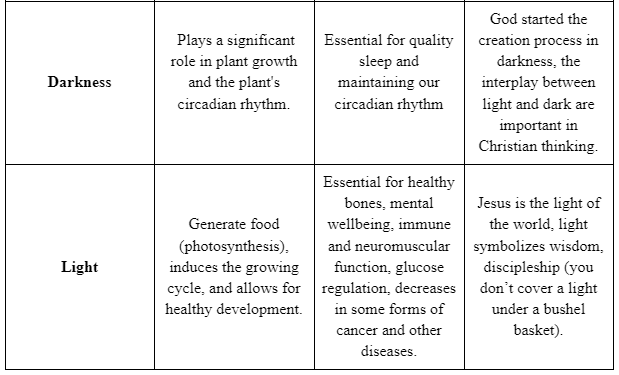
I have read that Jesus used agricultural illustrations because this is what people knew. However, equally important, and not frequently discussed, is the fact that there is, indeed, a fundamental link between people and plants. I believe this chart, which is far from an exhaustive comparison, is a case in point of this deep connection!
2. People and plants are both deeply impacted by what season of life they are experiencing. Spring, summer, fall, winter… new growth, maturation, flower/harvest, dormancy. Plants and people alike experience different seasons, and each season presents different needs. Paying attention to these changes, and the needs that come with them, is crucial for how we attend to the wellbeing of both our gardens and our lives: daily, weekly, monthly, yearly.
In the midst of this familiar rhythm and shared commonality of each season, then, there is also a uniqueness in the needs each season presents and, thus, how we are called to tend to ourselves in each season that plays a vital role in our collective wellbeing.
As we move through different seasons, it becomes important for us to consider some important questions, such as:
- What was used up in the previous season?
- What do we need to be particularly mindful of during this season?
For example, some plants have especially intense nutrient needs – such as nitrogen, phosphorus, and potassium – at particular times, while others use up lesser amounts. Thus, proper fertilization and crop rotation are essential for a healthy garden. As people, we, too, have certain needs at certain times. Family expectations, work obligations, health/medical challenges, celebrations (graduations, weddings, reunions), experiences of loss and/or difficult transitions (jobs, retirement, moving, death), all may bring with them different requirements, meaning how we tend to ourselves in them may change.
As such, it is important for us to make an assessment of how we are doing on a regular basis. What aspects of our wellbeing (physical, mental, emotional, spiritual, relational, etc.) are feeling parched or malnourished? What are we pleased with? What needs might require attention soon? Just as a garden needs regular care, so do we! (Click here if you would like to utilize our wellness assessment.)
3. Both people and plants need others to thrive!
In a garden, there are certain plants that get along well with each other. This is the concept of companion plants. Each has a role in the garden’s collective wellbeing. Some attract pollinators, others suppress weeds, others ward off “bad” bugs, while others provide shade. Essentially, companion plants grow well together, each contributing to the good of the other. Thus, intentionally increasing the diversity of plants increases the health of the garden.
Likewise, we need people in our lives who will help us to enrich our experience, show us new ways of thinking, expose our blind spots, and generally round out our human experience. Moreover, we also need to be willing to do this for other people, too. As with a garden, “mono-culture” is also detrimental to humans as we move through life’s various seasons.
As we enter into the summer season, I want to challenge you to do some digging around in your figurative and/or literal garden and ask yourself:
- Which of the basic elements do you feel called to tend to this season?
- What sort of companion (plants) do you need?
- What are you uniquely able to contribute to others?
May all be well,
Karen H. Webster
HSHC Co-founder/Executive Director

Three recipes for the start of summer that each have biblical roots!
Try out these seasonal and flavorful dishes for a refreshing meal or snack this summer.
- 2 Samuel 6:19 (NRSV) – “[David] distributed food among all the people, the whole multitude of Israel, both men and women, to each a cake of bread, a portion of meat,[a] and a cake of raisins. Then all the people went back to their homes.”
- Genesis 43:11 (NRSV) – “Then their father Israel said to them, “If it must be so, then do this: take some of the choice fruits of the land in your bags, and carry them down as a present to the man: a little balm and a little honey, gum, resin, pistachio nuts, and almonds.”
- Numbers 11:5 (NRSV) – “We remember the fish we used to eat in Egypt for nothing, the cucumbers, the melons, the leeks, the onions, and the garlic.”
Recipes from T. Colin Campbell Center For Nutrition Studies, Natalie’s Health, and The Simple Veganista.
Health of Seminarians Research Findings Spring 2022
Health of Seminarians Research Findings Spring 2022
One of our commitments as an organization is to conduct research specifically focused on the current state of seminarian health and wholeness. In the summer and fall of 2020, Travis Webster (HSHC co-founder) conducted his dissertation research study* among seminarians who attend Christian seminaries and divinity schools in the United States. The purpose of his study was to explore whether the factors that contribute to pastoral unhealth are already present in pastoral formation.
- Survey participants scored high on interpersonal relationships.
- They felt fairly connected to others.
- 2 of the 5 most important health practices that they want to be attentive to in their vocational service are relationship oriented.
- Research is continuing to show how relational health significantly impacts one’s overall health*, which is why we, as an organization, have increasingly focused on providing tools and resources for seminarians and others to use to tend to this area of wellbeing.
- Relational health is something that clergy struggle with, so we are pleased that these seminarians are being attentive to this aspect of being well!
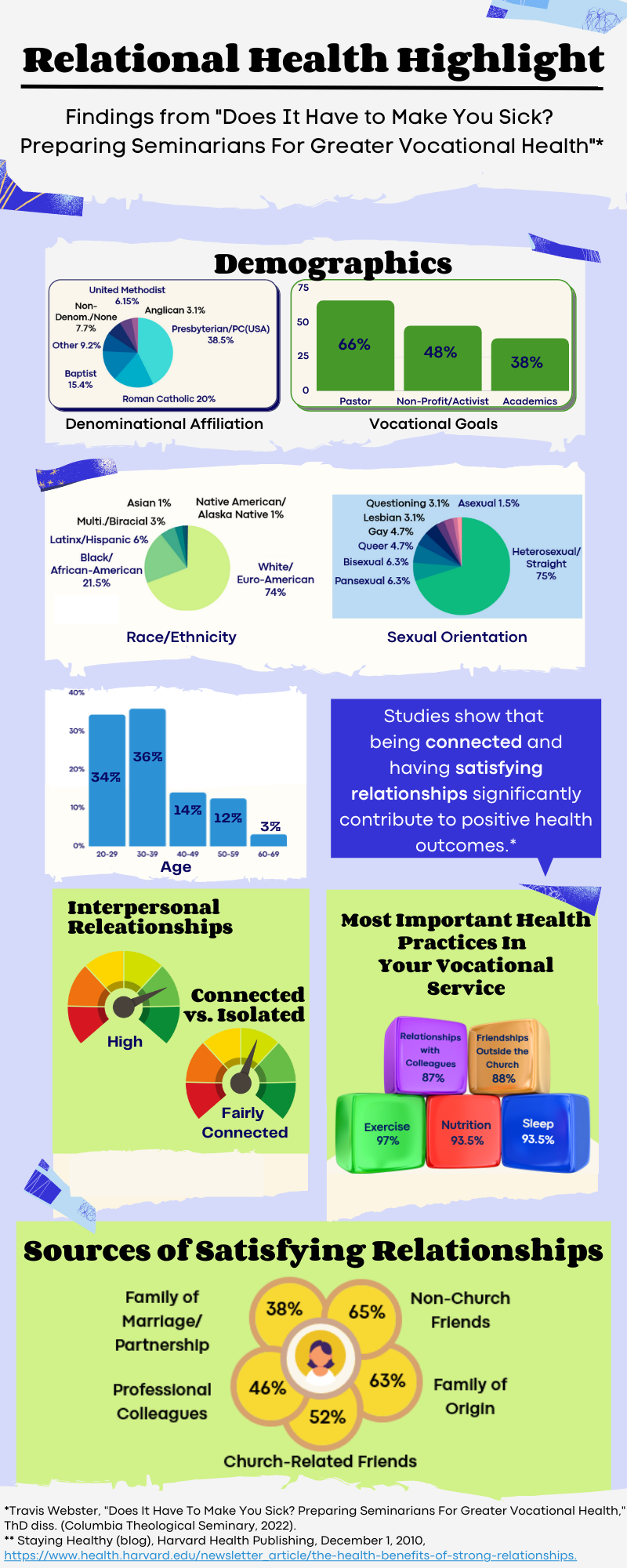
Note: very little research has been done on the health of seminarians. Therefore, we believe that the information Travis has gathered will positively contribute to addressing the overall health and wellbeing of seminarians, clergy, and congregations.
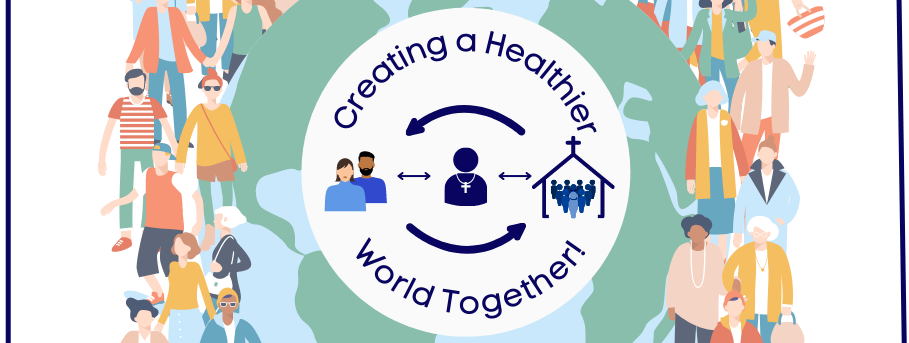
Trail Notes Spring 2022: Actively Working Towards Becoming MORE Contagious!
Actively Working Towards Becoming MORE Contagious!
When you see or hear the word “contagious,” what comes to mind? COVID? Masks? Other forms of infectious diseases or illnesses? Something unpleasant? Death? Given what we’ve been through over the past two years, it is quite understandable to have these kinds of thoughts.
However, it is also important to remember that some things that are “contagious” are positive and are, thus, good for our health when they spread. These include (but are not limited to!) a smile, laughter, words of gratitude, and/or other forms of compassion.
At its root, to be contagious means that an influence, quality, or nature has the ability to spread rapidly through verbal and/or physical contact with those around us. Again, this can work for good or for bad.
As some of you know, the very reason we exist as an organization is to promote positive contagion, particularly when it comes to spreading healthy lifestyle practices among seminaries and communities of faith. Our primary goal is to bring about greater health and wellbeing among seminarians (many of whom are future clergy) so that they can ultimately be partners with us in spreading healthy habits – not only in the settings to which God has called them, but also in our communities and throughout the world!
However, one of the themes that came up in Travis’ dissertation research, which focused on identifying what contributes to the health and unhealth of those preparing for a vocation in ministry (the results of which were generally consistent with Karen’s doctoral research project, also conducted among seminarians six years ago), is that when it comes to talking about health, the Church is pretty much silent.
In fact, it turns out that, among the seminarians who were interviewed by Travis in fall 2020 and spring 2021, “five of the [thirteen] interview participants said they had never heard health discussed in church, either theologically or practically, and of the eight who had, it was generally limited to a particular aspect of health, usually spiritual health. Furthermore, several interviewees indicated they had heard health talked about in church only because of the COVID-19 pandemic, meaning that, only two years ago, the number of interviewees who had never heard health come up in church would have been higher. What an unfortunate statement about the importance of health in church that it has taken a global pandemic to bring the subject to the forefront in some congregations!”
We think there is no better time than now – in this season where we celebrate the good news of Jesus Christ’s resurrection and the new life that is given to all, to work towards changing this reality, and we would like your help!
As we continue to empower seminary students, we want to challenge you to help break the silence about health in our communities of faith. When we work together, we can make a real difference in our own lives as well as in the world around us.
Peace,
Karen and Travis Webster
HSHC Co-founders
Don’t know where to start? Check out our 3 Ways to Spread Good Health in Our Communities of Faith post for ideas and next steps.
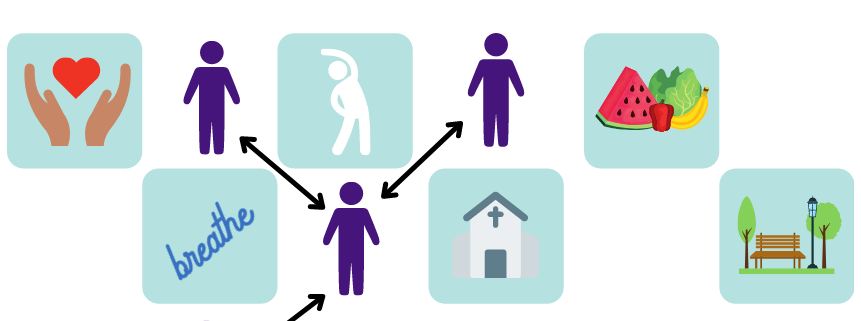
3 Ways to Spread Good Health in Our Communities of Faith
3 Ways to Spread Good Health in Our Communities of Faith
- Be contagious in worship by designating particular Sundays to highlight and explore various aspects of health (mental, emotional, physical, relational, spiritual, environmental, and more!). There are many health-awareness calendars online that can help guide you. For some examples specific to the United States, click here. For some international options, click here.
- Be contagious in educational opportunities by offering health-oriented studies. Something we have discovered, both in our research and through leading classes in congregational settings, is that there is a general lack of understanding of the body from a biblical and theological perspective, which significantly impacts how we treat our bodies (individually and collectively). Since Christianity is rooted in the embodiment of Christ, and given current social movements as they relate to body image, body positivity, body shaming, etc., we think this topic is extremely relevant and foundational for congregation health ministry initiatives. Here are a couple of books that we find to be helpful in exploring this topic:
- Embracing The Body: Finding God in Our Flesh and Bone, by Tara M. Owens
- Reclaiming The Body in Christian Spirituality, edited by Thomas Ryan
- Body: Biblical Spirituality For the Whole Person, by Paula Gooder
- Be contagious in mission and fellowship events. Does your congregation already provide yoga classes? Exercise groups? A food pantry? Fellowship opportunities? A lot of times, it is easy to think of these, and similar pursuits, simply as events that take place at the church or ministries supported by the church. However, many of these activities are already improving the health and wellbeing of the congregation and/or the community. Therefore, one strategy we want to encourage congregations to consider is exploring and defining a theological basis for health (in your context) and then tying these already existing health ministries into that theology. Your congregation may find that they don’t necessarily need to add many new programs and/or events; rather, it is simply a matter of being more intentional about the why of what you are doing.
Would you like some more ideas? Have stories about what has been successful in your congregation? We’d love to hear from you! Click here to contact us.
Peace,
Karen and Travis Webster
HSHC Co-founders
* Please note: following any of the links in this post will take you to sites containing third-party content.

Three recipes for celebrating Earth Day or any other springtime gathering!
Try out these easy and delicious party foods great for sharing with a group or adding to dinner.
Recipes from earthday.org, The Simple Veganista, and Minimalist Baker.
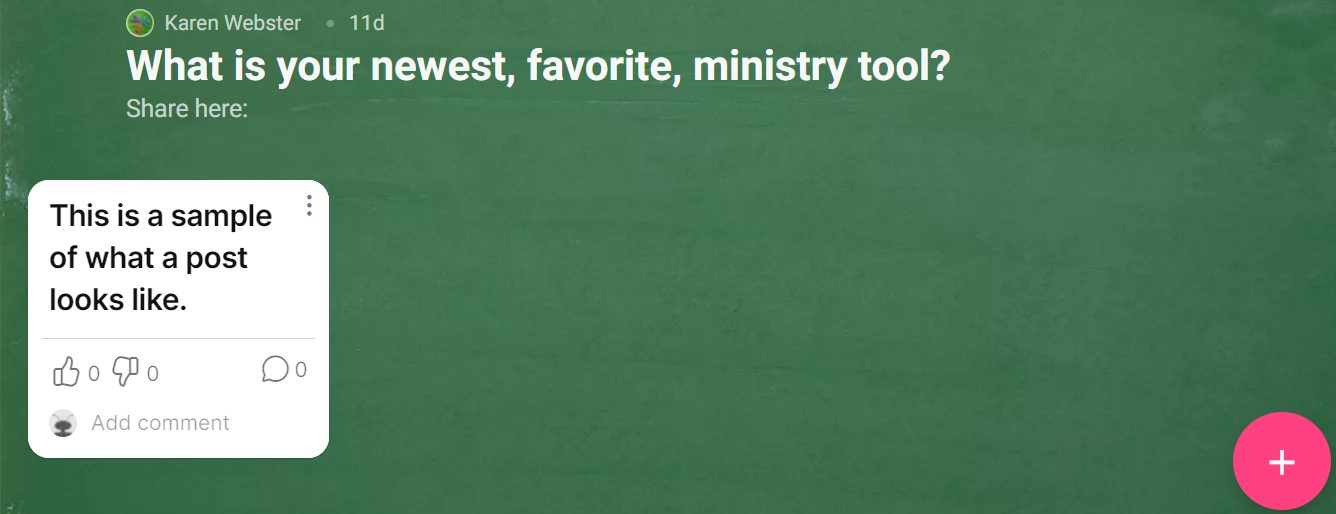
A Few of My (Newest) Favorite Ministry Tools and Online Resources*
A Few of My (Newest) Favorite Ministry Tools and Online Resources*
While January is sort of a let-down month for some people, I, personally, find it to be one of my favorite times of the year. With all of the hopes and possibilities that lie before me, I experience it to be quite energizing! Since, over the last several years, this has paired up with the beginning of the 16-week marathon training plans I began each January, I need all the energy I can get.
This year, however, I chose to take on a different kind of “marathon training plan.”
Rather than physically train in order to run a marathon, I decided to register at the beginning of January for a 15-week intensive online course focused on “Digital and Collaborative Teaching and Learning.” Plus, just to make sure I wanted to commit myself to such an undertaking (one in which I would have never imagined enrolling… kind of like when I signed up for my first marathon), I took a free, one-week online course on “Transforming Digital Learning” and loved it.
In other words, this year, I decided (God called me) to take on the challenge of 16 weeks of intense sitting (or standing) in front of my laptop and persevering through each and every mental “workout” (homework assignment) so that I could become better equipped to serve in the ministry (vocational marathon) to which God has called me… despite the numerous hours I had already spent in front of my screen due to COVID!
So how is my training going as I’m about to enter week 7 (almost halfway done)? My brain and body are exhausted, but I am loving the experience every step of the way… most of the time!
As a result of taking the class, I have found some new favorite ministry tools and resources, and wanted to share 4 of them with you:
Audacity: a free, easy-to-use, multi-track audio editor and recorder.
-
- Great for creating podcasts.
- Compatible with Windows, macOS, GNU/Linux, and other operating systems.
- For a quick overview on how to use it, click here.
Canva: featuring a SUPER user-friendly interface, this free resource allows you to create flyers, social media posts, videos, cards, presentations, photo collages, and more.
-
- Prior to taking this class, I had used Canva for a variety of different projects, but I hadn’t previously realized:
- Nonprofits can gain free access to all of their premium features, including amazing pictures and graphics.
- They have some amazing templates. If you haven’t taken advantage of those, I highly recommend it!
- Prior to taking this class, I had used Canva for a variety of different projects, but I hadn’t previously realized:
Padlet: an online digital bulletin board (and so much more!)
-
- It is used by teachers, students, professionals, and individuals of all ages and all around the world.
- It has a free basic plan (more tools and resources require a subscription).
- It makes collaborating fun and easy, especially because it supports any file type you can imagine, from Spotify Playlists to Excel Spreadsheets.
- The app is compatible with Windows, Android, iOS, and Kindle.
- To see Padlet in action, click here and let us know what your newest favorite ministry tool is!
OpenShot: a free, open-source, easy-to-use video editor.
-
- Compatible with Windows, macOS, Linux, and Chrome OS.
- For a quick overview on how to use it, click here.
And, another result of participating in my online course “marathon training program” is that, despite my best efforts, I’ve found myself having to be even more mindful of my screen time and lack of movement (again, COVID had already made that challenging enough).
Here are some resources that have helped me address both of these health challenges:
- 4 Stretches to Combat Too Much Screen Time
- The Ultimate ‘Deskercise’ Routine: Stretches for the Office
- Take Five 51 Things to Do When You Need a Break at Work
- Best Apps for Limiting Your Screen Time
Again, since there are so many wonderful tools and resources available for us to use in our various ministries (whether it is serving in churches, nonprofits, as chaplains, or something else), I hope that one or two of these will be helpful for you. Please take a moment and share your favorites via the Padlet link!
Peace be with you wherever your ministry takes you!
Karen H. Webster
HSHC Co-founder/Executive Director
* Please note: following any of the links in this post will take you to sites containing third-party content.
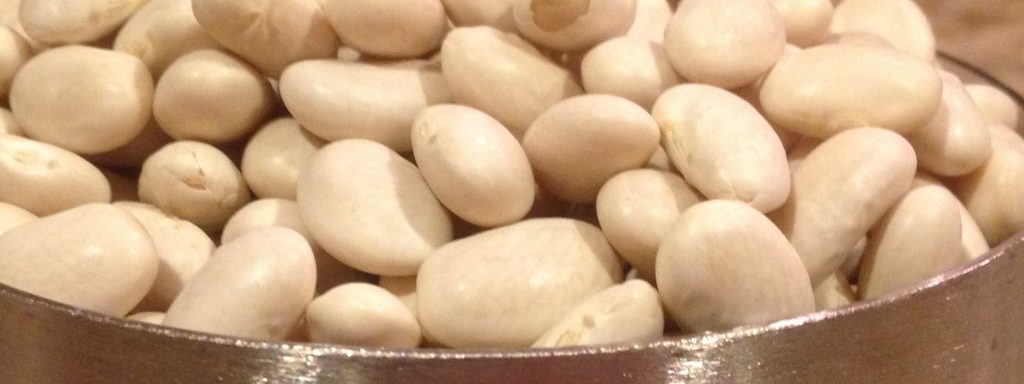
Simple and Fresh Recipes for Lent
- No oil option: sauté vegetables in vegetable broth and/or cooking wine
Note: All of these recipes contain a lot of olive oil. Consider adding 1-2 Tablespoons to start with and adjust as needed to suit your palate.
Recipes from The Greek Vegan
